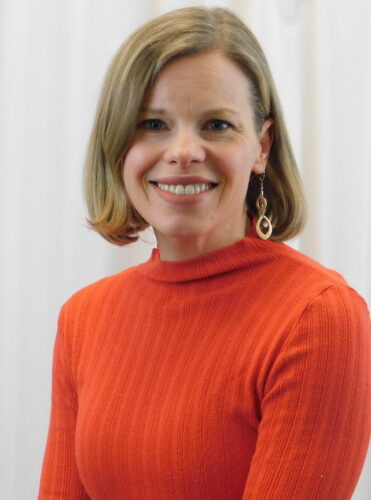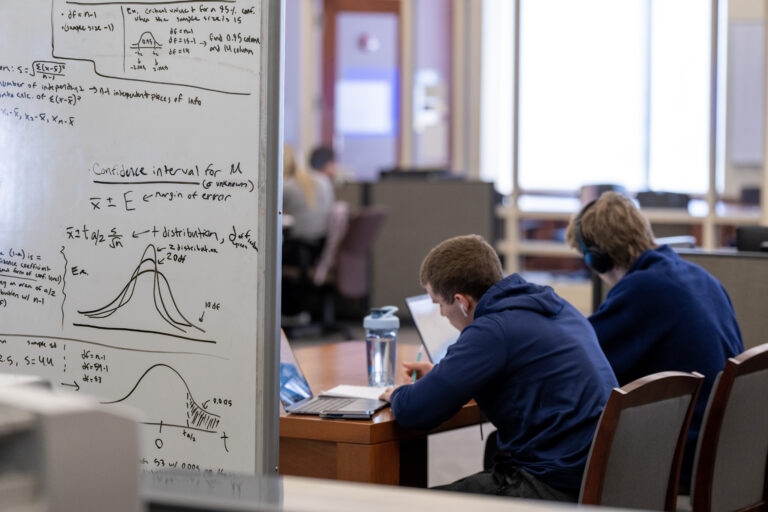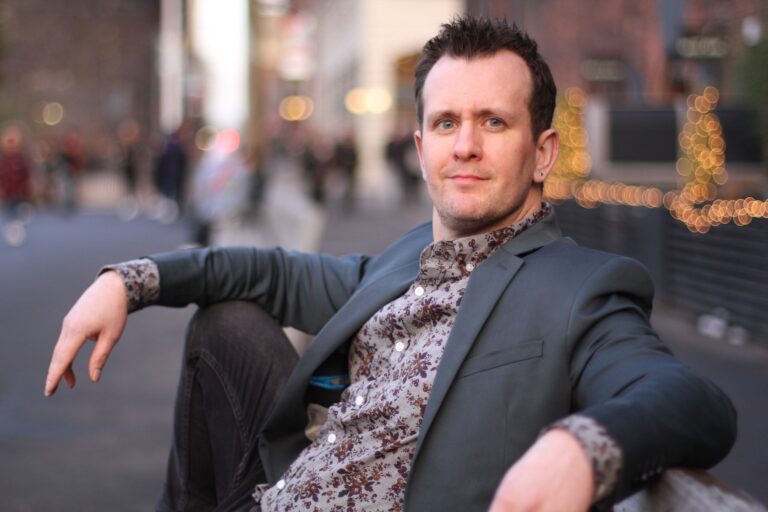
The Marquette Civic Dialogues program works to foster deliberation about the pressing issues facing our world today, prepare students to be citizens with purpose, and advance scholarship on the benefits of civic dialogue. Through programming and research, students are encouraged to Be The Difference by engaging differences in political thought and lived experience.
Eva Antoni, senior political science student, says attending the Civic Dialogues events helps her become a more well-rounded individual.
“I’ve come to learn a lot from these Civic Dialogues. One of them I attended, I remember both sides of the spectrum was represented, and we talked about controversial issues. It was really nice to hear other students’ opinions on certain topics,” Antoni says.
Dr. Amber Wichowsky is a professor in the Department of Political Science and the director of Marquette’s Civic Dialogues program and Democracy Lab. She received her doctorate from the University of Wisconsin–Madison and was a postdoctoral fellow at Yale University. She previously worked at the U.S. Office of Management and Budget in Washington, D.C. Wichowsky has been a faculty member since 2011 and is currently vice chair of the University Academic Senate.
Here in a Q&A, Wichowsky discusses her path into the political realm and her work fostering deliberation with students about pressing issues facing our world today and preparing students to be citizens with purpose.
Tell me a little bit about your background and how you got interested in politics?
As I explain to my students, my career path was not straightforward. I graduated with an interdisciplinary degree in environmental studies and then went to graduate school for public policy. I initially thought I would work in some capacity on environmental health and justice issues, maybe at the U.S. Environmental Protection Agency or at an international organization. My plans shifted a bit when I had the opportunity to intern with the White House Office of Management and Budget, which turned into my first job after I graduated with my master’s degree. After working in Washington, D.C. for a few years on community and economic development policy, I decided to return to graduate school for a Ph.D. in political science.
Of course, my interest in politics began much earlier. As an undergraduate student, I saw how people in northwestern Pennsylvania (where I went to college) came together to redevelop former brownfields sites to address contamination and improve environmental amenities. As a high school student, I really enjoyed debates in my history and government classes. And I know it sounds cliché, but I also grew up in a family that talked about politics and current events at the dinner table.
What draws me to the study of politics is a desire to learn how democracy works and how it can work better, and specifically how democratic institutions can help us address shared problems. As a political scientist, I conduct publicly engaged research to explore the social contexts that shape political behavior and how diverse communities engage contentious and complex public issues.
Explain what your Civics Dialogue program and Democracy Lab are all about and how they got started.
I started the Democracy Lab back in 2015. It was modeled a bit after some of the experiences I had as an undergraduate student at Allegheny College where I had the opportunity to participate in community-based research with professors and community members. I was also inspired by political scientists across the country who were working to shift the discipline in a more publicly engaged direction. Students in the lab have worked with schools and community-based organizations to evaluate efforts to deepen local civic engagement. Projects have ranged from designing community surveys to conducting experimental studies of community outreach efforts and educational programs.
The Civic Dialogues program is a more recent initiative, launched in fall 2021 with the generous support of donors. It is a two-year pilot program, though we will extend the program into at least 2023-24. The program is grounded in the belief that addressing complex and contentious issues requires meaningful and reflective interactions across a range of perspectives. We seek to create forums that help model these productive interactions, allowing students to develop their intellectual curiosity and civic skills as they inquire about public problems, evaluate possible solutions, and understand different approaches to achieving the common good.
What made you want to begin a program like this on campus?
We hear a lot about how polarized society is today. However, when you dig into the data, you see that while Democrats and Republicans increasingly distrust and dislike one another, their political differences haven’t necessarily diverged to the same extent. But you wouldn’t really know this because our political differences are increasingly driving how we interact with one another.
Our ability to engage in good-faith disagreement is an important civic skill. I was observing how the broader political climate was really undermining robust class discussion. Students were holding back, not necessarily because of anything that was happening in the classroom, but because they were worried about being called out or being misunderstood. They also had fewer successful examples of productive disagreement to draw upon from the real world. One risk of not engaging in some back-and-forth discussion is that we end up making poorer arguments ourselves. We also miss opportunities to identify new ways to address old problems or to find common purpose around new challenges.
Effective deliberation takes practice. Our classrooms are critical spaces where students learn how to communicate and collaborate with one another; it’s where they learn how to assess the credibility of evidence and the logic of arguments. These are citizenship skills that strengthen democracy, but they are important skills that employers value too.
A related concern is what I would call the flattening of political discussion – that everything gets taken as a red versus blue divide, when there is a lot of political diversity within the right and within the left. I wanted to surface more nuanced and complex discussions about public policy.
In a day and age with so much discord around personal political views, how important is it to teach students ways to conduct dialogue about the most pressing issues in the world today?
I worry that too many of us feel that the political system is too dysfunctional and that we don’t have much power to change things, at a time when we face significant challenges. Following decades of democratization in many parts of the world, we are now seeing rising authoritarianism and the loss of political freedoms. The economic fallout of the pandemic and Russia’s invasion of Ukraine are wiping away decades of progress on global poverty. Countries and communities are confronted with new ethical and economic difficulties given the quickening pace of technological change. Students question our collective abilities to address climate change and gun violence. Social trust, which can help connect people around a common purpose, has declined. My fear is that we’ll say, “what’s the use?” and withdraw further into ourselves, leaving us all worse off. Such alienation can cause both psychological and societal harm.
That said, I don’t want to paint a picture that is all doom and gloom. Gen Z students are quite civically engaged. There is a real interest in discussing the substance of policy debates. And most students I talk to say they want more robust discussion across lines of political difference. So, I think there is an opportunity to develop curricular and extra-curricular programming that helps educate students for the demands of democracy.
What do you believe is the most challenging factor when it comes to having conversations about one’s political views, and how does social media come into play?
One of the biggest challenges is just getting over the hump. We’re socialized to avoid talking politics at the dinner table. Most of us have at least one experience where political disagreement has gone off the rails, so we’re rightfully weary of trying again. Our experience is that once students start talking about their political differences, they find some joy in the discussion. It feels good to be listened to and treated with dignity and respect. And it feels good to reciprocate in kind.
However, our research also suggests that it’s easier getting to that place when we are talking face-to-face rather than online. I’m not someone who thinks that social media is all bad. Social media platforms have helped disparate individuals organize around shared goals. Vital, public information gets shared on Twitter. What’s bad is when we don’t have enough of the interpersonal experiences to counterbalance the downsides of our social media enclaves. When we disagree with someone on social media, we might not get to see all the other areas of shared understanding and agreement. It can be hard to have the give-and-take of reasoned arguments when we are limited to 270 characters and when the algorithms are designed to reward outrage over reflection.
How does this program connect to your research?
Over the last several years, I’ve worked with Jill Birren (Associate Professor of Educational Policy and Leadership) to examine how individuals have come together to address groundwater pollution in Wisconsin. In recent years, the state has integrated public engagement into the policymaking process with the hope that deliberation among key stakeholders will produce better and more legitimate policy solutions to this problem. Because it’s not yet clear how groundwater pollution is addressed under the Clean Water Act, communities have had to generally work out more decentralized and collaborative strategies to protect drinking and surface water. We’re interested in whether deliberation can yield more just and sustainable outcomes. So, you might say we’re studying deliberation in the real world – looking at how people engage scientific evidence, debate different approaches to the problem and resolve conflict. Most recently, we’ve extended our research to look at how communities in Wisconsin are responding to the environmental and public health risks of PFAS contamination.
Our work on the benefits and limits of deliberation in public policy also informs the research in the Civic Dialogues program. For example, I’m working with students to study the impact of our dialogue dinners. These are small, moderated group discussions about a contentious political issue. Participants complete a brief questionnaire before the dinner so that we can ensure viewpoint diversity at each table. Our preliminary results suggest that these dinners increase students’ willingness to engage in good-faith political disagreement and increase their comfort with political discussion. We are extending our research next semester to look at the downstream effects of the dialogue dinners on students’ civic engagement on campus and in the classroom.
What do you hope students take away from this program?
I have so many hopes! I hope they feel more confident in their abilities to engage in productive and honest political discussion. I hope they see value in coming together to discuss the most fundamental question in a democratic society: “What should we do?” I hope they find some areas of common interest and shared purpose, that they recognize the dignity and humanity in each other, and that they feel prepared to deal with the inevitable disagreement.
But to be clear, this program isn’t necessarily about changing minds or finding consensus. We live in a large, diverse country. Sometimes we need to work out our differences through compromise; other times we must work with others to build broader advocacy coalitions. We will fail at all of these if we only engage our like-minded peers and colleagues. Finally, I want students to be curious about the world and hopeful for the future!
When it comes to civic dialogue, where would you like to see the U.S. and the world in the coming years? Do you see change happening anytime soon? What do you believe it would take to make that change happen?
I would like more of us to take up the challenge of talking to others about public problems. These conversations are easier if we first talk about areas of agreement or our shared values. So, we must find ways to get to know one another. I tell my students that being on an increasingly diverse campus in the middle of a large city is a gift. We have so many wonderful student organizations that are sponsoring interesting campus events. I’m thrilled to see campus talks return after a two-year hiatus with the pandemic. And we have great opportunities to learn from others about Milwaukee’s past and present. What do you do if you’re no longer at Marquette? Check out your public library! Bring friends and neighbors together for a shared meal. Look closely at your own community: are there public spaces that could be revitalized as civic spaces?
There’s a wonderful quote from Pope Francis in Fratelli Tutti: “Unlike disagreement and conflict, persistent and courageous dialogue does not make headlines, but quietly helps the world to live much better than we imagine.” I think that’s right. These suggestions may seem like small acts, but a lot of public good can come from them.


